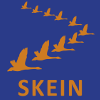River School – a gaining momentum school
River School is a 4-18 community school and sixth form in London. The primary school opened in January 2014 at the behest of the local authority and extended to year two at the time of the research. Total student numbers are roughly 1600 and primary numbers are increasing fast. The school operates across two campuses in different locations. Provision is duplicated across the two sites, each of which is assigned two deputy heads. Students are allocated between the campuses based on data collected by the school to avoid a demographic bias, as one campus is in a significantly less affluent area than the other.
The school intake has changed in recent years and there are increasing numbers of students with low literacy levels and aspirations, and high levels of EAL. The latter are well above the national average. The school has a large number of students from minority ethnic groups, of which the largest proportion is Turkish. Others are of Greek, black African and black Caribbean heritage. The number of FSM and/or looked after students is over 50%. The percentage of students with disabilities and/or SEND is above national average. The school is well networked nationally through its executive headteacher but less so for members of the senior leadership team and middle leaders.
The school was rated as Good in all categories following its most recent Ofsted inspection in December 2014. Ofsted highlighted the progress of less able students as an area for improvement, together with a lack of consistency in the application of systems and policies by all staff. The percentage of students achieving five or more A*-C GCSEs including English and maths has largely remained stable over the past few years (49%-51%). In 2014, the percentage of students who made expected progress in English was above the national average (79% compared to 75%), whilst the progress in maths was below the national average (59% compared to 71%). The school recruits a substantial number of NQTs (20) and had seven TF participants at the time of the research, although there were no TF ambassadors at the school.
There is an extensive programme of professional learning at River, featuring Teacher Learning Communities and a middle leader development programme plus an in-house MA programme that encompasses the use of action research. The professional learning environment features paired observations and feedback, in-depth book looks conducted by the SLT, specific focusing on particular groups of students (in some cases), and (some) collaborative planning for teachers and middle leaders. Heads of faculty similarly engage in collaborative CPD activities with each other, and mentoring and coaching is used extensively across all colleagues. Some faculty meetings involve CPD, while others do not, and there is some recognition of the value of specialist expertise and effort spent on building it internally. Following a period of centrally led whole school approaches to CPD, the school is moving to a more personalised approach with staff selecting development opportunities from a menu based on school priorities, and sustained over a longer period.
The teaching and learning approach at River aspires to help every student be the best they can be, through achievement/attainment and access to cultural capital and career preparation. The school has an in-house information, advice and guidance unit to promote aspiration, with two staff and regular visits to London cultural events and venues. The school also plans to extend Achievement for All more widely. It explicitly emphasises the importance of teacher creativity and is reluctant to develop a central model of pedagogy. There are, nonetheless some commonly used and encouraged teaching and learning strategies including: the use of starters and plenary activities, use of engaging activities, differentiation/extension, and Assessment for Learning. River’s approach to teaching and learning is based on the proposition that the foundation for good teaching is a combination of behaviour for learning, positive relationships and a focus on aspirations as well as achievement. Fostering independent learning has proved a challenge for River; lack of curriculum time, risk aversion, and student dependence on teacher input are cited as considerable obstacles.
Student-teacher relationships appear excellent, and the school now has a positive behaviour management policy based on rewards, and the support of non-teaching pastoral teams. The belief that inspirational teaching and good relations are key to effective classroom behaviour management is evident across teaching and learning practice at River, and behaviour data are monitored and linked to progress data, which surfaces patterns and enables planned interventions. The one area of behaviour which the school still finds challenging, is behaviour in corridors and the playground. The quality of teaching and learning is constantly monitored via joint observations, book looks, and performance management.
The leadership at River set a vision for the school, that all students will be achieve high standards. Leaders constantly remind staff of their capacity to make a profound impact on students’ life chances. All staff are expected to be good or outstanding teachers, and the senior leadership team are fully engaged in supporting them, having developed and implemented a programme of observations, feedback - and are introducing coaching. The middle leadership CPD strand is focused on middle leadership as well as practical training in mentoring, appraising, lesson observations and feedback. There are regular data windows, involving individual students and teachers, and a monthly data dashboard, including comparison of predicted and current attainment across year groups, and attendance.
